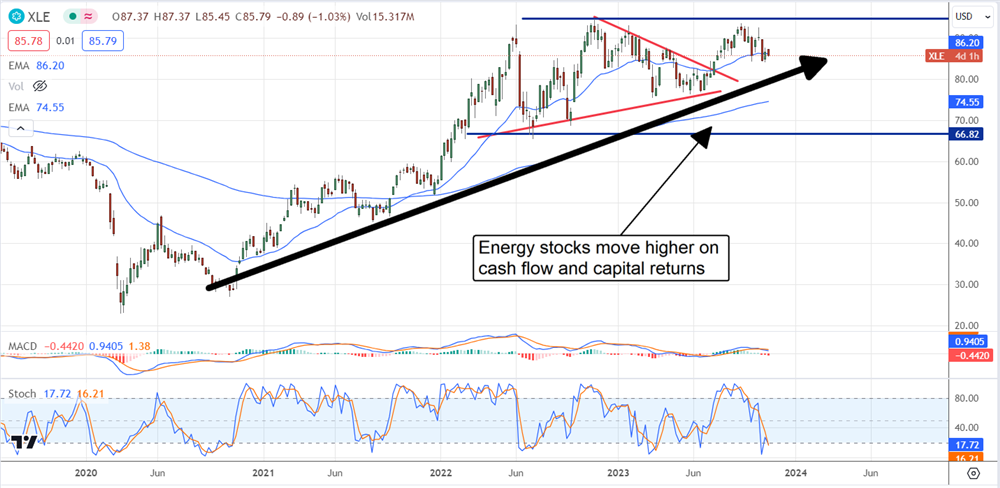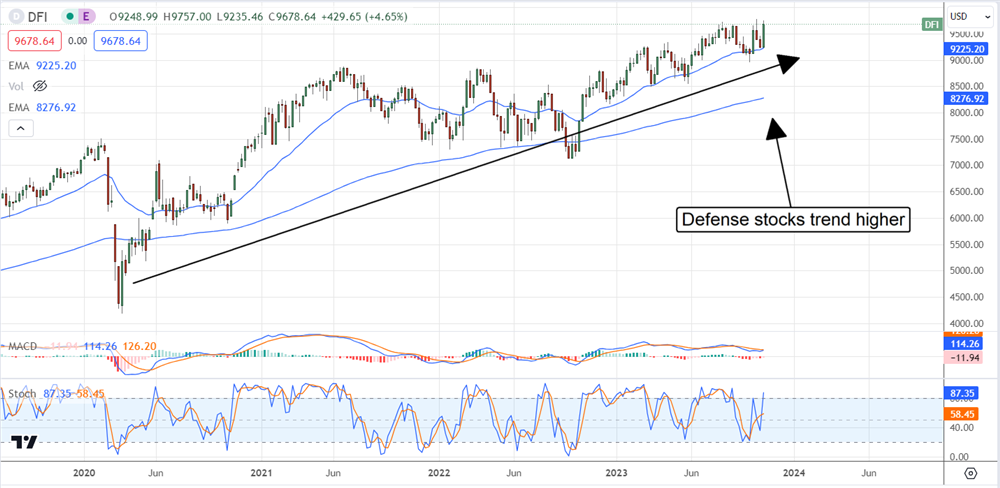
Publicly traded companies utilize debt for many reasons. They can use it to fuel growth, pay dividends, or buy back shares, but like any financial entity, enough is enough. When interest rates were low, it was nothing for an S&P 500 company to run up its leverage because it was cheap to borrow.
Now, the times are different, and the cost of borrowing is rising. This means that corporate cash flows are getting pinched and putting the squeeze on growth and capital return plans.
However, not all industries are in the same position, and there are two that stand out as cash flow kings with the ability to sustain and increase capital returns. The energy and defense sectors are producing significant cash flows and paying down their debt (at least some companies are), positioning themselves for the times and their ability to pay and sustain dividends increases.
Additionally, they are also repurchasing shares, which provides a significant tailwind to their price action. The defense sector is up about 15% for the year, trending higher and ready to set new highs, while the energy sector is flattish YOY but ready to make a run for a new long-term high.
The energy sector cash flows are strong despite deleveraging
The energy sector is having a tough time in Q3, but this is compared to last year's windfall results and still high analysts' expectations. The takeaways from results from Exxon Mobil (NYSE: XOM) and Chevron (NYSE: CVX) are that sequential strength is present, and operational improvement aids results. While the top and bottom line results were weak because of oil price deleveraging, cash flow remains robust and provides value for investors.
Exxon, although cash flow and earnings are down compared to last year, generated sufficient profits and cash to pay its dividend, repurchase shares, reduce debt, and build cash reserves while investing in the business. Cash flow is driven by sustained demand growth and ramping North American production that the Pioneer acquisition and higher oil prices will bolster.
The average price of WTI in Q3 is lower in 2023 than in 2024 but up significantly from earlier in 2023 and relatively flat on a YOY basis. With OPEC+ capping production, the oil price will likely remain elevated, if not trending higher, to drive persistently strong cash flow for Exxon and its competitors.
Other signs of Exxon's cash flow strength are the historically low leverage ratio it's running in 2023 and the recent dividend increase. Long-term debt to equity is well below 1X, with cash on the rise. The dividend was increased for the 41st year by 5%, and it is still less than 35% of earnings. Chevron, while increasing its total debt, lowered its net debt significantly while returning $20 billion to investors.
The Energy Sector ETF (NYSE: XLE) is trending higher within its trading range and may make another try at a new high soon. The critical resistance is near $95.

Business is booming for defense contractors
Results from defense contractors for Q3 were solid across the board, including growth, top and bottom line outperformance, and strength across geos and segments. The takeaway is that global conflicts are escalating and driving business in this segment. While Lockheed Martin (NYSE: LMT) stands out as a business that increased its debt compared to last year, it produced solid cash flows, raised its dividend, and doubled the buyback authorization.
However, General Dynamics (NYSE: GD) and Northrop Grumman (NYSE: NOC) used their improved cash flow to pay down debt while buying back shares and paying dividends. Between them, $1.5 billion in debt was repaid early to reduce the load and free up additional cash flow.
The group pays an average yield of nearly 2.25% and has a history of annual increases, which is significant to income investors. With payout ratios in the 30% to 40% range, these near-Aristocrats could sustain annual increases long enough to reach Dividend King status without earnings growth, and growth is in the forecast.
The NYSE US Large Cap Defense Index is bullish and trending strongly higher. Recent activity suggests the group will break to a new high soon and continue its uptrend.














